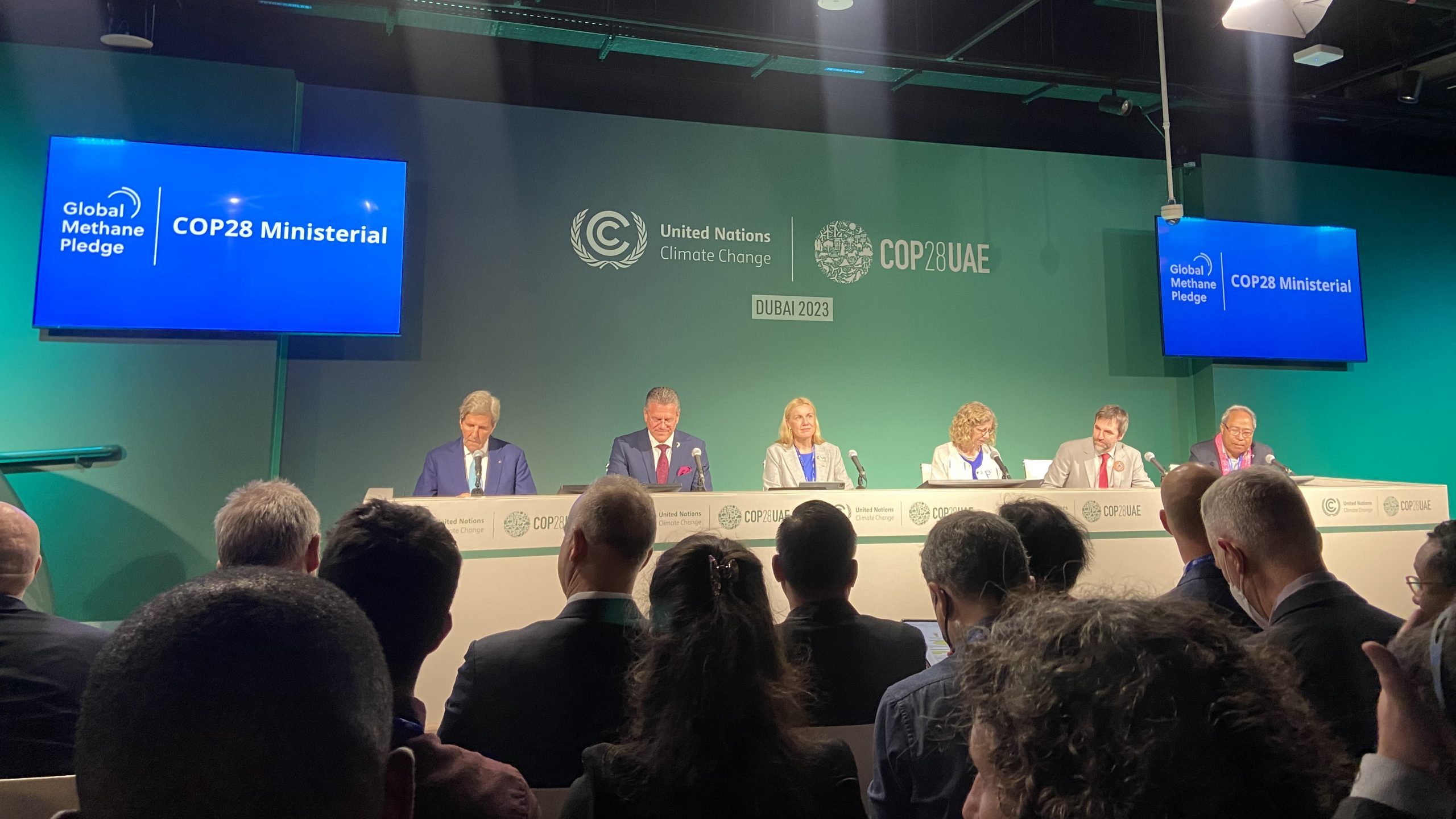
Hungry for Action at COP28
Charity Zimmerman
Graduate Student School of Policy and International Affairs and School of Economics,
NSF One Health and the Environment Research Trainee
Dec. 12, 2023
Food is a hot topic at the COP this year, and not just because many of the lunch venues have 20-minute wait times outside, under the blazing Dubai sun. A central focus of this year’s summit is on sustainable agriculture, resilient food systems and climate action. Various sources attribute between 10-30% of all global greenhouse gas emissions to food systems, with the single largest source of methane emissions coming from the agriculture sector (in large part due to livestock), and the third largest source coming from food waste (due to the anaerobic breakdown of organic matter). There has been a recent emphasis on the climate impacts of methane, as it is one of the most potent greenhouse gasses. Although methane dissipates from the atmosphere more rapidly than carbon dioxide, according to the Environmental Defense Fund, it has roughly 80 times the warming power of CO2 once it enters our atmosphere. It is for this reason that many countries at the COP have asserted that addressing methane emissions is the fastest avenue for slowing warming temperatures and ensuring that we stay under the 1.5-degree Celsius goal set forth by the Paris Agreement.
The UN Food and Agriculture Organization (FAO) is expected to launch a road map for countries to help meet their climate goals through agrifood solutions on December 10th, the thematic day on food, agriculture, and water. Based on announcements and sessions up to this point in the summit, we expect to see the FAO call on developed countries to 1) increase in financing of novel and regenerative agriculture projects and 2) move toward alternative protein sources, in addition to reducing meat consumption. In the spirit of this emphasis, an impressive two thirds of the food offerings in the venue are entirely plant based.

While bringing attention to the climate impacts of agriculture, and especially methane, is important, some attendees at COP have questioned whether this year’s increased attention on food systems is simply an attempt to detract from the pressing need to decouple from fossil fuels. This year’s summit is hosted by the United Arab Emirates (UAE), one of the largest oil-producing countries. Emphasizing alternate avenues of GHG emissions may be a strategy for oil companies and their allies to continue their business-as-usual approach. However, the US agreed early in the summit to call on oil and gas companies to reduce methane leaks across their systems to “near zero” by 2030, which is a step in the right direction.
The United States Special Presidential Envoy for Climate and former Secretary of State, John Kerry, led a Global Methane Pledge Ministerial, where ministers from several countries solidified their commitments to deliver on the goal to cut methane by at least 30 percent by 2030. The Global Methane Pledge addresses methane across three key sectors – agriculture, waste, and oil and gas. Several representatives, including Kerry, emphasized that although cutting methane will be necessary for addressing climate change goals, this is not a “get out of jail free” card for the fossil fuel industry as we still need to progress towards decarbonization if we hope to maintain a livable planet.
Climate-friendly innovations in the agriculture and food-security sectors are impressive and ongoing, with sessions across the summit highlighting an extensive array of projects. I heard talks discussing agroforestry in Brazil, lab-grown meat in South Africa, and agrovoltaics (building solar farms on the same land as agricultural fields) in Egypt in addition to observing several informal consultations on implementing the Sharm el-Sheikh joint work on climate action on agriculture and food security. Exciting commitments are coming out of COP28, but as noted in the closing of the Global Methane Pledge Ministerial, announcements don’t reduce emissions. We must continue to assess our progress on our commitments through processes such as the Global Stocktake.
I look forward to more exciting news and ideas that are sure to emerge by the end of the conference, especially on December 10, and hope that what many are calling the “Food COP” will open the hearts – and stomachs – of us all as we work toward mitigating and adapting to climate change.

